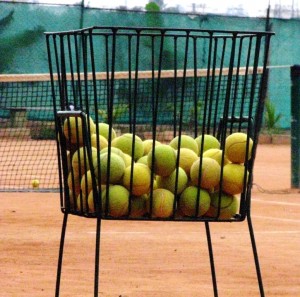Me & my brother grew up watching Boris Becker deliver his boom boom serves and Mats Wilander execute his stylish two fisted backhands with ease. We enrolled in a tennis academy and ended up with a coach who disappointed us no end!
For one full year (or so it seemed, it definitely was a very long period of time) his standard bark was: “Watch the ball”. If he caught us playing on points, punishment runs ensued. Same with playing fancy shots. If we picked up footwork or two from TV, his response was standard: drop the racquet and go take a run.
We had no option but to get used to him. Eventually, we did get used to him. And we had no other option but to ‘watch the ball’.
What we had no idea about was this : that we perhaps were picking up the most fundamental habits of watching the ball, getting clean ground strokes and volleys.
We didn’t realise that we had made rapid progress on the court. For, he would never allow us to play a competitive match against each other. “Watch the ball. Aim for where you want to hit and then hit it there”. That was his refrain.
We were free of competition. We were free flowing. We were playful. After about a year of just tapping the ball and getting the footwork and strokes right, he finally relented. Much like an upset father handing over the keys of his prized car to just-become-old-to-drive son. And allowed us to play games on points.
Very soon, we started playing competitive tennis at club and district level. We surprised people and won a heap of matches and then carried on with life. Tennis didnt feature there.
Many many years later, at a corporate picnic, I picked up the racquet to tap a few balls. In my mind, I could clearly hear him shout ‘watch the ball’. I hadn’t touched a racquet in a long while, but I perhaps had one of the cleanest ground strokes amongst all the folks there. Far better than the folks that were ‘regulars’ at the game! The next three hours of awesome tennis were in a state of seamless flow! I couldn’t have been more thankful for all the hoarse ‘watch the ball’ hisses! For it taught me near lessons of ‘learning the basics well’ for a lifetime.
You see, the basics can get boring. But, the basics are the only aspects that matter in the beginning. Mastering the basics will eventually get you the game. It is so tempting to get on with the ‘game’. But the best coach / teacher/manager is the one who helps in keeping that temptation in check and focuses on getting the basic habits in place. Delivering results, by ensuring good habit formation. For, it is in the formative years that work habits are formed. The right habits are the ones that make a difference eventually.
Formative years are so very crucial that the role of managers who manage people in their first jobs assumes great importance. There is their chance to shape thought and action and thus, in a way, shape lives. Sow the right habits. Managers who manage students who are crossing over to corporate have a great responsibility of not only delivering results but also help good habits take shape for a lifetime.
Students taking up corporate jobs, often want to do the shiny thing. Strategy and stuff sitting out of corporate offices! Things that have been picked up from the text books. Much like the awesome cross-court shots of Mats Wilander that we picked up from TV.
In retrospect, it is clear now that what we had to do as a beginner was to watch the ball and get the footwork right! The competitive game came later. And it came without effort and stayed on for a long time. Almost automatically!
Developing good work habits. The power of focus. An understanding of what constitutes success can all be learnt. All of this is so key to strategy building. All of these are learnt early in work life.
Good Management Trainee programs have people sweating it out in the field as their hallmark. That builds character and a sense of purpose. If you are a management trainee slugging it out, you are lucky. If you are a manager of one of these lucky blokes, get them to watch the ball, so to speak, while delivering results. Assimilation of what happens on the field needs to happen when the mind is fresh!
‘Strategy’ will flow. Later!



A well written post, Kavi. I feel the same way. However, shorter business cycles and moving goal posts tend to make managers change their “watch the ball” message ever so often. Managerial responsibilities coming up earlier in career does not help either.
Is there a way of accelerating the development of good work habits? I am not sure – for some things there is no substitute for time
The topic of this blogpost represents the conundrum of our times. This will have a serious and long term impact on our workforce for decades to come.
Indeed ! The quarter to quarter existence seems to be the undoing of several things that would have been done by way of common sense prevailing.
I am not sure of a ‘stand alone’ acceleration package. What perhaps would be needed is conscious increase in challenge and conversation. But if it comes to that, the question still doesnt go away : where is the time!?!
Dear Kavi, While I read through the post, I was reminded of my early days in training when you did the same to us – formative years of being a trainer. I am able to relate to this fare better and have been constantly able to practice the same with my Trainers here. Thanks for reinforcing it again through this post.
You are very kind Ravi! Thank you if you are able to relate to that although at that time, I had very little formal ideas around these topics. It seemed like spending time was the most simple and logical things to do!
Enjoyed reading it Kavi. Very eloquently put.
Thank you Subbu !! 🙂
Hi Kavi,
Love the post. I think you hit home a very important aspect of people management and make a great point from the perspective of the employee career development standpoint too. I am just thinking what the equivalents are of the “punishment runs” 🙂 and I think that also is the difference between great and not-so-great managers. Your coach had the luxury of issuing punishment runs without much of a push back. A people manager will receive poor scores on an employee happiness survey. And Gen S&M is impatient to grow. So, what are some of the things that we can do to get fresh from campus employees – or employees that are at the same skill level – to understand they need to watch the ball and not play competitive games yet, and that this is our investment in their career? Any ideas will be really helpful.
Those are some very pertinent issues that you raise Nitin. Issues that are still there on my mind and sitting there without solutions!
It takes a while for a relationship to be established, context to set, initial walls to be climbed. And it takes the managers a while to see that what is being spoken of / advocated is after all good before they consider attemtpting.
Even as I write this reply to the comment, I realise this is fodder for a new blogpost! 🙂
very well written and surmised the essence of getting your basics right. The foundation on which a good super sructure can be built.
Thank you Mahesh! Delighted that this post resonates !
Well written Kavi. The watch the ball refrain is familiar to one who would have played any sport – cricket, soccer, hockey, etc.
What is key is that the manager (as a coach) have the ability to sense when the people are off the ball and loose focus.
Often times, we managers and leader are also culpable in making new joinees watch too many balls as it were – and loose focus.
Focus – what we need.
Thanks for reiterating.
Warm regards,
Rajesh
Hello Rajesh!
That ability to see when people are not watching the ball is key. Well said. And it takes some effort to swim against the tide, stay focused and spot it well. Good managers who are good coaches do this naturally.
I am not sure though, of making them watch too many balls or is it really about exhorting them to play too many shots that our undoing lies in. In my opinion it is the latter.
But you are right, focus brings to the table a whole heap that wouldnt show up otherwise
Well written Post,as usual, Kavi ! Yes, the challenge is that the basics may seem like such simple solutions that we overlook how important they really are.
Thats why they are the basics. Isnt it, Sanjith? And thats why they are so easy to ignore and move on. Much to our folly as we will discover later on!
Thank you for stopping by!
Good post Kavi. Some like me dropped out of the tennis class becuase we had enough of watching the ball. Taking short cuts aint going to work in any field. Nicely written.
Lovely post, Kavi!